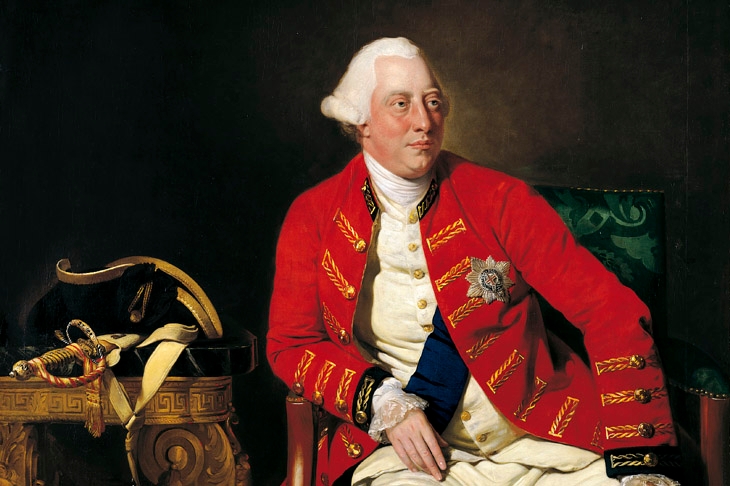Before he died aged 44 (probably of a pulmonary embolism, poor chap), Frederick, Prince of Wales, compiled a list of precepts for his son, the future George III. ‘Employ all your hands, all your power, to live with economy,’ was one. ‘If you can be without war, let not your ambition draw you into it,’ was another.
The result of such sensible parentage is that today, about the only things we know about our third-longest-reigning monarch are that his nickname was ‘Farmer George’, that he lost America, and that he went bonkers, providing a lucrative franchise for the significantly more famous playwright Alan Bennett.
This — as Robert Hardman’s charming, moving and sensitive portrait Genius of the Mad King (BBC1, Monday) made clear — does him a great injustice. Apart from being a loving and, by Hanoverian standards, involved dad to his 15 children, he kept impressively up to date with all the advances in science and agriculture, was a patron of the arts and of exploration, popularised bathing and the seaside holiday, mingled with his people (barking pleasantries at them with his trademark ‘What what what?’) and, after a 59-year reign, left his country peaceful and prosperous.
‘It had been an age of bloodshed and revolution but not in George III’s Britain,’ concluded Hardman, while another historian noted: ‘His contemporaries — Catherine the Great, Frederick the Great, these are revolutionary and damaging figures. They destroy things. Napoleon destroys everything. George III makes everything secure and safe.’

Robert Hardman inside the Royal Archives with George III’s private papers
God, I would have found him dull to study at school. Yet would Britain have become half so great, in the ensuing century or so,without this genial cove who ran the country like a benign chief executive? An obsessive letter writer and micro-manager, he’d dash off screeds at all hours of the day (timed to the minute, so as to guarantee a prompt response), advising on everything from the sum required to buy off his dreadful eldest son’s latest unsuitable mistress (£5,000 — about £750,000 in today’s money) to the way Captain Cook should behave on his travels (‘treat any locals you find with respect’, ‘make presents of such trinkets as you may have on board’).
The reason we know all this is that his every jotting is kept in an archive at Windsor Castle, now open to all because it has been photographed and put online. Hardman, who has been covering royal affairs for years, presumably got the gig because he is now so trusted by the palace. I’m glad because he’s that rare thing: a presenter who’s affable, presentable and informed, who doesn’t have any of those tics or mannerisms that set your teeth on edge.
But when it comes to giving seriously good documentary, I don’t think anyone beats Andrew Graham-Dixon. Presumably everyone agrees with me on this — and if you don’t, you’re mad. He’s got the look (well-cut navy-blue suits, open-neck shirts and shades), the foreign languages and accents, the deep art-historical knowledge and the passion.
More than that, though, in his brilliant new series Art of France (BBC4, Monday) he comes across not as though he’s delivering a lecture or rehearsing a script, but more as though he’s engaging afresh and thinking aloud. Whether he’s waxing lyrical about the fan vaulting in the world’s first Gothic cathedral, the Basilica of Saint Denis, or noticing a page from the Très Riches Heures du Duc de Berry where a peasant is baring his bum, the effect is to make you feel as though you’re sharing with him his journey of discovery. He has the gift of being able to look right into the camera with a total lack of self-consciousness. If I were one of his competitors, I’d want to kill myself.
Where I did initially want to disagree with him was when, responding to those people who think the hyper-Muslim enclaves in parts of Paris are in no way French, he came up with the usual right-on line about France being a mongrel nation, the product of numerous cultural influences and of violence greater than anything it’s experiencing today.
But then he led us back in time and you realised he did have a point. Images of Protestants being butchered by Catholics in a market square and of a tree so abundant with dangling hanged corpses it must have been a real job fitting them all up there. Watching it immediately after the George III documentary, I felt rather smug: those barbaric and weird continentals are so much more prone to violence and revolution than us stolid and phlegmatic English.







Comments